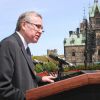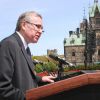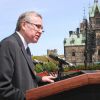OTTAWA - Motion-312 may have been shot down in the House of Commons, but Stephen Woodworth hasn’t given up.
Pro-lifers must adapt their message, MPs say
TORONTO - Political lobbying is not just about what you say, it’s how you say it, according to a pair of Conservative MPs. That was just one of the tips Stephen Woodworth and Brad Trost gave to those attending the National Pro Life Conference.
“Although I am in Parliament, I happen to believe that the world does not stop and end inside the House of Commons,” said Woodworth, MP for Kitchener Centre. “The real important work that needs to be done is outside the chamber of the House of Commons.”
Much of this has to do with language and scope, Woodworth told those attending the third and final day of the conference hosted by Alliance for Life Ontario in Toronto Oct. 25-27.
Woodworth said too many MPs are pre-occupied with the word abortion. By adjusting the language and widening the scope of the message, the pro-life movement will garner more support by avoiding sensitive words — something Woodworth admits is easier said than done.
“People don’t necessarily take away from words the meaning that I take away from them,” Woodworth said. “We have members of Parliament who are actually suggesting, in relation to Motion 312, that the Prime Minister should have a veto over the independence of backbench MPs.”
Woodworth said some MPs “couldn’t see the democratic tradition and the value of backbench independence” and “they were willing to sacrifice because of their pre-occupation with the word abortion.”
Although Motion 312 — Woodworth’s motion for a debate on when life begins — did not mention the word abortion, it led to its failure.
But Woodworth does not completely blame the failure on those MPs pre-occupied with abortion — pro-lifers are at fault too for not being able to adapt how they communicate their message.
“If you simply go in with your truth and you fail to recognize the truths that others are concerned about, you won’t make that connection, you won’t develop that relationship and you won’t be listened to,” he said. “If you cannot convince someone that a child is a human being before birth you are not going to convince them about abortion.”
While Woodworth focused heavily on how to convey the message, Trost addressed how to understand a politician’s position on the pro-life cause.
“The weakest link in Canada’s pro-life movement has been political,” said Trost, MP for Saskatoon-Humboldt. “In Canada we know the political aspect is very important and the political aspect needs to change and evolve and we need legislation to start moving it forward.”
As a Liberal turned Conservative, but a constant pro-life supporter, Trost cautioned the audience to never assume which way a politician will vote.
“People don’t actually know what they’re voting for or what they’re voting on (when electing politicians),” said Trost.
“Politicians can do one thing in Ottawa and another thing in the constituency. People are shocked when they find that out.”
He continued by stressing the importance of checking an MP’s voting records to see who stands strongly on either side of the issue, but also exposes those in the middle who’d be easier to influence.
“If you don’t know where your MP has voted, get involved, talk to them. A lot of these people who have come in from professional careers may not have fixed views. "
MP introduces motion condemning sex-selective abortion
OTTAWA - MP Mark Warawa is seeking the support of his colleagues in the House of Commons in condemning sex-selective abortion.
"Recent studies have shown that the practice of aborting females in favour of males in happening in Canada," said Warawa, adding that polls show more than 90 per cent of Canadians believe the practice should be illegal.
Motion 408 is in response to numerous inquiries and concerns his office received after the CBC presented an investigation on gender selection last June. With hidden cameras, the CBC visited 22 private ultrasound clinics in Canada. They found that most of these clinics allowed ultrasounds to tell the sex of the baby so that the parents could choose to terminate the pregnancy if the unborn child was a female.
Unequivocal condemnation from Parliament will send a strong message that will help to bring an end to this form of gender discrimination in Canada, said Warawa.
Warawa introduced Motion 408 on the heels of the defeat of fellow Conservative MP Stephen Woodworth's Motion 312. Woodworth was trying to foster a debate about when human life actually begins. His motion was defeated Sept. 26.
The motion has already garnered the support of the Catholic Civil Rights League of Canada.
"In light of the defeat of Motion 312, it's encouraging to see a new private member's motion aimed directly at condemning abortions performed for gender selection," said Joanne McGarry, league president, in a statement. "The league supports this motion and will be following it closely."
Motion 312 defeated, but wins support of 10 cabinet ministers
OTTAWA - The defeat of Conservative MP Stephen Woodworth's Motion 312 Sept. 26 was expected, but the level of support, including that of 10 cabinet ministers, came as a welcome surprise to pro-life groups and political journalists.
Defeated 203 to 91, Motion 312 was supported by 87 Conservatives, a majority of the 163-member Tory caucus, as well as four of 35 Liberal MPs.
The Conservative MP's Motion 312 would have set up a parliamentary committee to examine the 400-year-old definition of when human life begins.
Immigration Minister Jason Kenney, a devout Catholic, was the first cabinet minister to publicly announce he would support the motion. The votes of the other cabinet ministers were not anticipated however. It garnered the support of Status of Women Minister Rona Ambrose, Government House leader Peter Van Loan, National Revenue Minister Gail Shea, Trade Minister Ed Fast, Intergovernmental Affairs Minister Peter Penashue, International Co-operation and CIDA Minister Julian Fantino, Agriculture Minister Gerry Ritz, Foreign Affairs Secretary of State Diane Ablonczy and Minister of State for Seniors Alice Wong.
Prime Minister Stephen Harper respected the House tradition of free votes on private member's business, something the New Democratic Party was not prepared to do, said Woodworth at a news conference following the vote.
"NDP members, with their extreme personal preoccupation with abortion, actually suggested that we give the Prime Minister power to veto private members' motions," he said. "Can you imagine. They propose to take away one of the most effective democratic tools left to MPs in the face of an MP's diminishing role."
Woodworth said he'd done his job by exposing Subsection 223(1), "the most vile, most unjust law in Canada." It rules that a human life does not begin until a baby is actually born.
Though opponents of Motion 312 have said the abortion debate is settled and the courts recognize a right to abortion, Woodworth pointed out Justice Bertha Wilson in the 1988 Morgentaler decision left the question of protection for unborn life to Parliament. That means the question of how to honour universal human rights in Canada "will remain open and unresolved," he said.
"This issue was never closed, it's not closed now and will never be closed if we in Parliament continue to stick our collective head in the sand," he said.
He remarked on the huge volume of mail mostly in favour of the motion, the hundreds of petitions with thousands of signatures that showed both women and men supported it. The volume of mail was so big it clogged up the Parliamentary post office, he said.
"I want Canadians to remember that no great issue is ever determined by a single vote in the House of Commons," he said. "It remains for the Canadian people to rise up even more strongly in defence of honest laws and universal human rights, which are so shamefully violated by subsection 223(1)."
"I think Canadians will conclude that much of what was said by those speaking against Motion 312 in the Parliamentary debate lacked any logic or coherence," he said. "Many speakers against Motion 312 showed they were willing to abandon time-honoured Canadian values in a single-minded personal preoccupation with abortion no matter how grave the consequences."
Campaign Life Coalition national organizer Mary Ellen Douglas congratulated the MPs who had the courage to vote for the motion.
"We hope this will give them the courage to continue to bring up the issue in Parliament as often as it takes to obtain a law," she said.
She said all of the identified pro-life MPs except for a couple were accounted for in the vote. But many others not identified as pro-life also supported it.
"The point is they were presumably voting on freedom of speech," she said, noting "pro-aborts" have said the issue "cannot even be discussed in Parliament."
"Although the motion was defeated, it was very encouraging to see the subject brought forward, as well as the groundswell of support through meetings with MPs, e-mails, letters, phone calls and petitions," said Catholic Civil Rights League executive director Joanne McGarry.
"We thank Mr. Woodworth for proposing the motion, and all those MPs who supported it and thereby kept respect for life on Canada's agenda," McGarry said in a statement. "This particular motion has been defeated, but the debate on this issue, which many Canadians believe is anything but 'settled,' will continue until Canadian law recognizes the humanity of the unborn."
WeNeedaLAW.ca represents a grassroots campaign to bring about federal restrictions on abortion. Its director, Mike Schouten, defended Ambrose against an attack by Abortion Rights Coalition of Canada spokeswoman Joyce Arthur who accused the minister of throwing "women under the bus" and described her vote as a "slap in the face to the women of Canada."
"The Abortion Rights Coalition of Canada is a group of extremists who advocate for abortion on demand through all nine months of pregnancy," said Schouten in a Sept. 27 release. "Not only does Ms. Arthur continually misinterpret the Supreme Court decision in 1988, she also advocates for the legality of late-term and sex-selective abortions."
Woodworth vows to continue fight for 'dignity of every human'
OTTAWA - Despite his motion to reopen the debate on when life begins being defeated Sept. 26, MP Stephen Woodworth has vowed to "fight on against the denial of the worth and dignity of every human."
The Conservative MP's Motion 312 would have set up a parliamentary committee to examine the 400-year-old definition of when human life begins. It was defeated by a vote of 203 to 91 in the House of Commons.
“I will be there to encourage and to speak out in defence of the Canadian values championed by Motion 312,” Woodworth said in a news release after the vote. “If possible, I’ll travel the country to talk about the very, very grave importance of enshrining in Canadian law the equal worth and dignity of every human being.”
Woodworth came under fire from Opposition MPs, and even some within his own party, as they claimed the motion was just a backdoor route to reopening the abortion debate. It's a claim Woodworth denied throughout the process. Prime Minister Stephen Harper and the government's chief whip, MP Gordon O'Connor, were among the more prominent Conservative members who made it clear early in the process that they would not support Motion 312.
However, eight cabinet ministers, including Immigration Minister Jason Kenney and Rona Ambrose, the Minister for the Status of Women, were among the 87 Conservative MPs — more than half the caucus — that supported Woodworth's motion.
Woodworth called on Canadians to redouble their efforts to promote the view that democratic institutions, honest laws and every human being are more important than preoccupation with abortion or any other agenda or ideology.
OTTAWA - To a nearly empty House of Commons Sept. 21, Conservative MP Stephen Woodworth made a final impassioned final plea for an “open-minded, evidence-based study” of the 400-year-old Criminal Code definition of a human being.
He spoke last, after MPs on both sides of the House spoke against or in favour of his private member’s Motion 312 that would establish a parliamentary committee to examine the Criminal Code’s subsection 223(1) that says a child is not a human being until the moment of complete birth. Opposition MPs argued the Motion represented a “backdoor” to re-criminalizing abortion and violating a woman’s right to control her own body.
But Woodworth disagreed.
“About abortion, I say this: recognizing children as human before the moment of complete birth will not resolve that issue,” Woodworth said.
“Even Justice Bertha Wilson, who championed abortion rights in the Morgentaler decision, wrote that Parliament should ‘inform itself from the relevant disciplines’, the very proposal embodied in Motion No. 312.
“Recognizing the reality that children are human beings before complete birth will affirm the hallowed principle that human rights are universal, not a gift of the state that can be cancelled by subsection 223(1),” he said.
Only between 30 and 35 MPs attended the final hour of the House of Commons' agenda dealing with private member’s business on a rainy and gloomy Friday afternoon, with members coming and going.
But the diplomat’s gallery was surprisingly full with several members of the pro-life movement present, including Linda Gibbons, a grandmother who has spent a total of nine years in prison for silently praying outside abortion clinics in Toronto.
The government’s chief whip, MP Gordon O’Connor, sat in the House as if taking careful note of Conservative MPs who rose to speak in favour of the Motion. O’Connor had told the House in the previous hour of debate the government would not support this motion or allow the abortion debate to be reopened.
Though he did not speak in the second hour, his presence in the nearly empty chamber spoke volumes. At one point, he crossed the aisle and sat for several minutes at the same desk as NDP justice critic Francoise Boivin, a vociferous opponent of Motion 312. Boivin had been singing O’Connor’s praises in the previous week for arguing as she has that the motion is an attempt to recriminalize abortion.
Minister of State of Foreign Affairs Diane Ablonczy also sat in the House, though from her body language — head down, poring over reading material, seemed to indicate she was disengaged from the debate around her. While traditionally private members’ business is a free vote for MPs, many are watching to see what publicly identified pro-life cabinet ministers will do when Motion 312 comes to a vote and whether they will break with the government’s stated opposition to the ban.
The Parliamentary Secretary to the Natural Resources Minister MP David Anderson was the highest-ranking Conservative to risk the prime minister’s ire by speaking in favour of the motion. He opened by saying he had received 200 e-mails urging his support the previous evening alone.
“I have had over 1,500 responses encouraging me to support Motion No. 312,” he said. “I find it interesting that many of them have come from young women. I think that is a rebuke to the opposition members, reminding them that there are young women in this country who believe in what is being proposed in today's motion.
“We need to recognize that a majority of Canadians believe that human life begins long before a person is born. We can understand that if the evidence establishes that a child does in fact become a human being before the moment of complete birth, then subsection 223(1) has some major problems and it is actually a law that dehumanizes and excludes a whole class of human beings from legal protection.”
“The member for Kitchener Centre's desire to open up this debate has an end goal of changing the legislation to enable the fetus to be declared a human being,” argued NDP MP Irene Mathyssen. “We are all very aware that such a change in the definition will place Canada directly on the regressive path to banning abortions.
“A fertilized egg is not a class of people, and I am offended that the member would shamelessly misrepresent the women's rights movement as an example of why we should open the door to changing abortion rights in Canada,” she said.
NDP MP Sylvain Chicoine told the House “the debate is closed in the minds of Canadians.”
He said Woodworth was either “contradicting himself” or “hiding his real desire to turn women who have abortions into criminals.”
When the debate ended, the new Deputy Speaker NDP MP Joe Comartin asked for a voice vote on the motion. The “nays” were far louder than the “yeas” to the CCN journalist sitting in the gallery. Comartin called it a second time and still the nays were louder. But there were more “yea” voters sitting in the House.
“In my opinion the yeas have it,” he said. However, at least five MPs stood up, meaning a final vote will be held Sept. 26.
Canadian bishops throw support behind Motion 312
OTTAWA - The Canadian Conference of Catholic Bishops (CCCB) issued a Sept. 18 statement affirming support for the sacredness of all human life from conception to natural end as Motion 312 comes to its second and final hour of debate in the House of Commons.
Conservative MP Stephen Woodworth's private member's motion would review the Criminal Code's definition of a human being in the homicide section that declares: "a child becomes a human being within the meaning of this Act when it has completely proceeded, in a living state, from the body of its mother."
The statement was signed by CCCB President Archbishop Richard Smith. It is posted on the CCCB web site (www.cccb.ca) and provides a link to Motion 312's text.
"The Catholic Church holds that a human being comes into existence at conception," Smith says in the statement. "The lives of human beings are, therefore, sacred at every stage in our existence — from beginning to natural end.
"As the House of Commons prepares to debate Motion 312, the bishops of Canada invite all members of the Parliament of Canada to take into full account the sacredness of the unborn child and each human life. We also encourage Canadian Catholics, and all people of good will, to pray that our legislators be blessed with wisdom and courage to do what is best to protect and further the common good, which is based on respect for the human dignity of all."
Life Week debates create dialogue on B.C. campuses
For the first time, several pro-life groups on university campuses in British Columbia held Life Week simultaneously to bring the abortion debate to their peers.
“They debated the morality of abortion and whether abortion should remain legal,” said Anastasia Pearse, western campus co-ordinator for the National Campus Life Network. Jojo Ruba from the Canadian Centre for Bio-Ethical Reform debated the pro-life side while various philosophy professors took the pro-choice side.
Committee set to examine definition of a human being
OTTAWA - A Conservative MP’s private member’s motion that critics charge will re-open the abortion debate has been officially declared votable and will have its first hour of debate on April 26.
MP Stephen Woodworth’s Motion 312 would set up a Parliamentary Committee to examine Canada’s 400-year old definition of a human being in subsection 223 (1) of the Criminal Code. He has asked the definition be examined in light of advances in modern medical science.
Calls for a right to after-birth “abortion” to kill newborns have added to the urgency of this debate, he says.
Private member’s motion could re-open abortion debate
OTTAWA - A Conservative backbencher is using a private member’s motion that could re-ignite the abortion debate in Parliament.
MP Stephen Woodworth, who represents the Ontario Kitchener Centre riding, tabled a motion Feb. 6 that Parliament appoint a special committee of 12 members to review the section of the Criminal Code that states a child becomes a human being “only at the moment of complete birth.”
Though Woodworth told journalists he was not addressing abortion in his motion, Justice Minister Rob Nicholson issued a terse statement, saying “The Prime Minister has been very clear, our government will not reopen this debate.”











